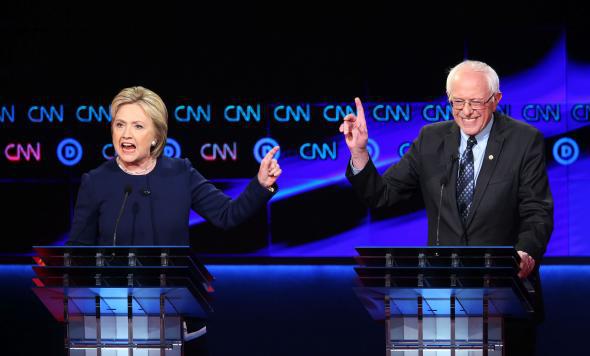Hillary Clinton and Bernie Sanders will step on the CNN stage in Brooklyn at 9 p.m. Thursday for their first debate in more than a month, and for their final one before next Tuesday’s New York primary. A lot’s happened since the two Democratic hopefuls squared off last, with the race veering between the silly (who’s better at taking the subway; who might be “qualified” to be president) and the serious (Hillary’s relationship to her husband’s crime bill; Bernie’s grasp of the wonky details he’d need to break up the banks).
The debate was a relatively late addition to the calendar, and only came to be after days of squabbling between the two campaigns over its location and time. Clinton would have likely preferred to scrap the event entirely and just sit on her lead, but—barring some sort of catastrophic error on her part or a truly spectacular performance by Sanders—it’s unlikely to fundamentally alter the race. Still, it’s Bernie’s best chance to make up ground before next Tuesday’s contest, and possibly his last to change the dynamics of a race that has long favored his rival. With that in mind, here’s where things stand heading into the prime-time showdown:
On the Trail
The Democratic race is in no danger of being mistaken for the Republican one—which has only marginally improved since deteriorating into an actual dick-measuring contest last month—but the tone of the campaign has taken a clear turn toward the nasty in recent days. While Clinton and Sanders recently called a cease-fire in a fight over who was “qualified” to be president (which Bernie briefly turned into a war), both have continued to attack each other on the stump in the lead-up to New York’s primary. In the past week alone, Hillary went after Bernie on guns and immigration while Sanders returned fire on climate change and campaign finance. Those aren’t new lines of criticism, but the attacks have been particularly pointed with Hillary tying New York’s gun violence to weapons that come from Bernie’s home state of Vermont and Sanders painting Clinton as a champion of fracking, which has been banned in New York.
These various spats should come up on Thursday evening, but they aren’t the only hot topics that are likely to be raised. Clinton will probably be pressed to explain her husband’s recent confrontation with Black Lives Matter activists—and possibly the cringe-worthy, racially themed “CP time” routine she took part in alongside New York Mayor Bill de Blasio. Sanders, meanwhile, will need to prove he has a better handle on the executive levers he’d need to use as president than he appeared to have in his widely panned interview with the New York Daily News editorial board.
In the Delegate Race
Since the pair met at the previous debate on March 9, both have gone on their own separate multicontest winning streaks. Clinton swept all five states up for grabs on Super Tuesday II on March 15 with huge wins in Ohio and Florida, and then cruised to victory in Arizona on March 22. She hasn’t been doing much winning since, though. After Clinton’s run ended, Sanders posted commanding wins in two of three March 22 contests and then went on to reel off five more statewide wins: Alaska, Hawaii, and Washington on March 26, Wisconsin on April 5, and Wyoming this past Saturday.
But while “momentum” may be on Bernie’s side, the math clearly isn’t. According to the Associated Press’ estimates, Clinton leads Sanders by 261 pledged delegates and 428 superdelegates. All told, she’s ahead on the scoreboard by nearly 700 total delegates, 1,758 to 1,069, with less than 2,000 still up for grabs. Bernie’s camp, though, maintains that those Hillary-backing superdelegates could still change their mind—an incredibly unlikely but still technically possible development that his campaign is using to get everyone thinking about a contested convention. If Sanders were to bring the nominating fight all the way to the convention floor, he’d still likely come up short on the first ballot in Philadelphia—but he would make things mighty uncomfortable for Clinton, especially if she needed her super-friends to push her across the finish line.
In New York
Facing a rather massive delegate gap, Sanders needs to start racking up big wins in delegate-rich states, and he needs to do it soon. His problem, though, is that New York doesn’t currently look like the place that’s going to happen—and he needs it to be. While he’s trimmed Clinton’s lead in state polls by more than half since the start of the year, he’s still down by more than 13 points in the RealClearPolitics rolling state average. Still, there hasn’t been a single major state poll taken all year that found Bernie within single digits of Hillary in the Empire State. Nate Silver and his FiveThirtyEight team, meanwhile, peg Clinton’s chance of victory next Tuesday at 98 percent.
Sanders is hoping for a repeat of the Michigan primary, where he was an even larger underdog in the polls but still went on to win. Another major polling upset, though, seems particularly unlikely given New York’s demographic makeup includes far more minority voters than in those states where Sanders has fared best this year. From his perspective, then, that only increases the need for a blockbuster performance—or an unforgettable flop from his rival—on the CNN stage.
